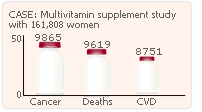
Many women take multivitamins as an alternative to more drastic forms of menopause relief such as hormone therapy. Although these multivitamins can help to keep the body functioning as it ages, many women believe that such supplements can help to stop the development of dangerous diseases and conditions which become more common post menopause. Hormone therapy itself has been shown to encourage diseases such as breast cancer and recent surveys which have noted that this may encourage women to turn to multivitamins as a way of treating the problems of menopause without the dangers associated with hormone therapy. Little research has been undertaken to assess whether or not multivitamins can actually help prevent breast cancer and cardiovascular disease post menopause, but new research looks to change this.
Recent research has looked into the effects of multivitamin supplements on the prevention of breast cancer and cardiovascular disease in postmenopausal women. A group of 161,808 menopausal women took part in this study as part of the Women's Health Initiative. These women took part in either observational or clinical trails which determined the effectiveness of the supplements they took. Supplements included dietary modification, vitamin D and hormone therapy. These menopausal women were inducted the trail from 1993 to 1998 and on average the women were followed for 8 years for both the clinical and observational trails.
Researchers recorded cases of breast (invasive), colon, endometrium, kidney, bladder, stomach, ovary, and lung cancer, while cardiovascular problems were recorded as myocardial infarction, stroke, and venous thromboembolism. The over all mortality rates of the women involved was also noted.

Of all the menopausal women who took part in this trail 41.5% took multivitamins. At the end of the trail 9619 cases of cancer had been reported, 8751 cases of cardiovascular disease and 9865 deaths had also been noted. After in-depth analysis, researchers found that such results represented no identifiable benefit to menopausal women from the consumption of multivitamins as opposed to other treatments such as hormone therapy.
Although this research makes it clear that multivitamin supplements are not the answer for reducing the risk of potentially serious diseases in postmenopausal women, it does not mean that multivitamins do not benefit women in other ways. When compared to treatments such as hormone therapy, multivitamins have been found to help calm the symptoms of menopause without the associated risks which can often come with the long term use of hormone therapy. It's important for women to consult their doctors for professional advice upon which supplements to take for menopause relief and whether hormone therapy is right for them personally.